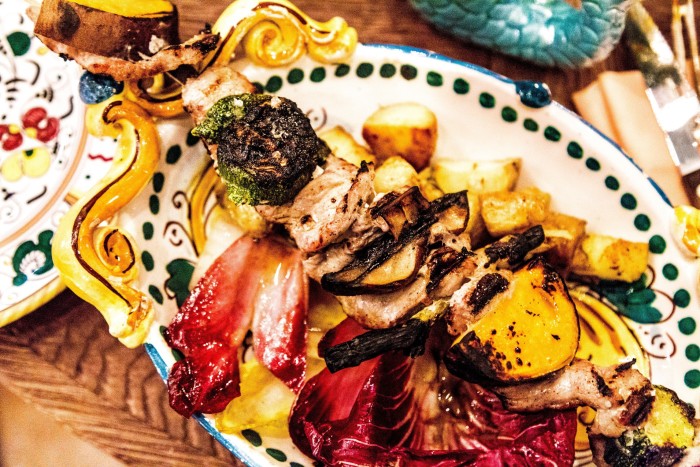[ad_1]
Receive free Travel & leisure industry updates
We’ll send you a myFT Daily Digest email rounding up the latest Travel & leisure industry news every morning.
Big Mamma, the French-owned Italian restaurant group known for serving Instagram-worthy dishes and drinks to diners in Paris and London, has been valued at €270mn after selling a majority stake to the private equity firm behind the Gail’s bakery chain.
The investment from London-based private equity group McWin will be used to fund an expansion push in the US and the Middle East, building on Big Mamma’s existing portfolio of 23 restaurants across five European countries, including its original trattoria East Mamma in Paris and London’s Circolo Popolare.
Big Mamma’s co-founders Victor Lugger and Tigrane Seydoux will continue to run the business and retain a minority stake. A clutch of 17 early investors in the restaurant group, including French telecoms billionaire Xavier Niel and media tycoon Stéphane Courbit, will exit their investments.
Lugger, who along with his partner Seydoux have netted millions of euros from offloading some of their personal shareholdings as part of the deal, told the Financial Times that the investment would help Big Mamma “go big . . . and build a global brand in affordable, experiential luxury dining”.
Big Mamma’s mix of punchily named, colourful dishes — including the “naughty garlic bread” and the “nice buns” beef ragu brioche bun — as well as its extravagantly designed restaurants and affordable prices has proved a draw for diners, with the group now serving 15,000 customers a day across its 23 sites.

“If you want to build a global brand, if you want to always go bigger in terms of design, authenticity, HR, recruitment, food, and if you want to do it beyond your frontiers . . . it takes a strong backbone and it takes partners that can help you,” said Lugger.
But Lugger, who also runs restaurant payment app Sunday, said he was aware of the risks for restaurant brands of taking on a private equity partner given their chequered history in the sector.
Restaurateur Jeremy King’s relationship with private equity investor Graphite Capital soured and their partnership ended in 2017 after just a few years. Recently, private equity-backed chains such as Prezzo have had to undergo restructurings to stay afloat.
“It’s questionable the impact that some private equity had on quite a number of brands . . . in this country,” said Lugger. “It’s like when you get married — if you don’t look at the fact that 50 per cent of marriages end up in divorce you’re stupid . . . all you need to do is just walk the high streets in the UK.”
But McWin pitches itself as a specialist in the restaurant and food technology sector, having invested about €1bn across nine brands since the private equity group was established two years ago. McWin also backs pasta restaurant Vapiano and White Rabbit Projects, the venture behind Indian restaurant Kricket and Italian delicatessen Lina Stores.
“We are painfully aware about the shortfalls that private equity has had in the sector,” said Harry Goss, a partner at McWin. “What makes a good restaurant investment is that the growth opportunity when you look to exit is just as good . . . as when you enter. If you get that wrong, then it doesn’t really matter how many restaurants you’ve opened, if the restaurant has lost its way.”
As an indication of his commitment to the business, Lugger said last week he had tasted 70 dishes over two days during a visit to Mamma East.
Big Mamma is set to launch its fourth new site this year in Milan over winter, attempting to outcompete Italian trattorias and pizzerias on their home turf, with a third restaurant in Spain also planned for next year. The majority of Big Mamma’s 2,400 staff are Italian and almost all of its ingredients are sourced directly from Italy.
Lugger estimated it would take at least two years to launch Big Mamma’s first US venture, saying that he was considering locations in Chicago, Miami and Atlanta. In recognition of the brand’s ambition, he added that it was “probable” he would move to the US within the next two years.
Henry McGovern, one of McWin’s founding partners, said Lugger and his partner had “pioneered a new type of restaurant experience, providing customers with a truly unique and memorable visit at every site”. The deal is set to close by year-end.
[ad_2]
Source link

